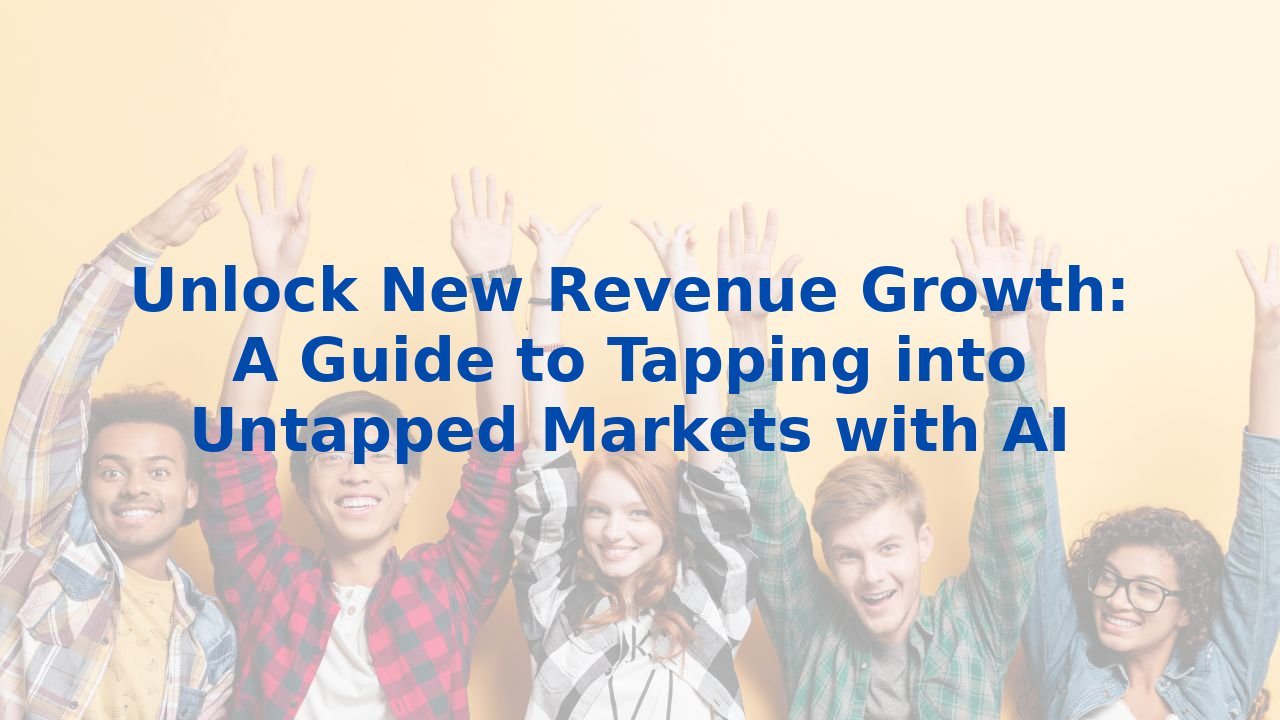Unlock New Revenue Growth: A Guide to Tapping into Untapped Markets with AI
Unlock New Revenue Growth: A Guide to Tapping into Untapped Markets with AI
In a world that’s constantly evolving, businesses face the challenge of keeping pace while exploring untapped markets for growth. The question arises: how do you unlock new revenue streams in an increasingly competitive landscape? The answer lies in harnessing the transformative power of Artificial Intelligence (AI). By strategically integrating AI into everyday business processes, organizations can not only enhance efficiency but also open doors to previously unexplored opportunities. Let’s dive into the myriad ways AI can revolutionize your organizational strategy and set you on the path to success.
1. Redefining Meeting Efficiency
Meetings are pivotal in any organization, but let's face it—they can often be bogged down by administrative tasks. Imagine if you could redirect that time toward innovation and strategic initiatives. AI can automate scheduling and streamline meeting documentation, minimizing human error and maximizing productivity. For instance, AI-powered voice assistants can handle scheduling seamlessly, while AI-driven tools can listen in on discussions and capture key takeaways. This not only saves time but also ensures clarity among team members, fostering a more collaborative environment focused on actionable insights.
2. Elevating Sales and Marketing Strategies
Sales and marketing are the lifeblood of revenue growth, and AI can supercharge these departments. With advanced analytics, AI can provide invaluable insights, enabling sales teams to focus their efforts on high-potential leads. AI algorithms can predict customer behavior, helping businesses understand which clients are most likely to convert while identifying those at risk of churn. Moreover, chatbots enhance customer engagement by providing instant responses to inquiries, thereby improving conversion rates. AI not only optimizes resource allocation but also nurtures customer relationships, turning potential sales into loyal patronage.
3. Transforming Customer Service
Customer satisfaction is paramount in today’s market, and AI plays a pivotal role in enhancing service quality. Automated systems powered by AI can analyze interactions between customer service representatives and clients, identifying areas for improvement. By assessing conversation quality and customer satisfaction metrics, organizations can adapt their service approach in real-time, resulting in better customer experiences. This not only helps in retaining clients but also converts satisfied customers into brand advocates, further fueling growth.
4. Streamlining Product Development
Imagine a product development cycle that is quicker and more efficient. AI makes this vision a reality. Generative design software utilizes AI to explore vast possibilities based on given parameters, significantly reducing the time and resources consumed in prototyping. This allows organizations to cultivate innovation—a vital component for tapping into new markets. Teams can quickly iterate on designs and concepts, ensuring products are not only delivered faster but also meet market demands effectively.
5. Automating Content Generation
Content is king, but creating it can be a challenge. AI tools are increasingly capable of generating engaging, high-quality content efficiently. From product descriptions to insightful articles, AI can produce a staggering amount of copy in a fraction of the time, allowing your marketing team to focus on strategy and creativity instead of being bogged down in production. This capability ensures you remain relevant in content-heavy markets and stand out in the crowded digital landscape.
6. Revolutionizing Human Resources
The HR landscape is evolving, and AI is at the forefront. By automating recruitment processes, AI can conduct initial assessments and screenings of candidates, drastically reducing the workload on HR teams. This not only saves time but also ensures that the best candidates rise to the top. With AI handling many of the repetitive elements of hiring, HR professionals can center their efforts on fostering organizational culture and developing talent, key components in nurturing an agile workforce.
Why Invest in AI Training?
As compelling as it is to integrate AI, the true potential of these systems can only be realized through effective employee training. Equipping your team with AI expertise can significantly amplify its benefits:
- Enhance Skills: Training elevates employee capabilities, enabling them to maximize the use of AI tools, optimizing workflows and decision-making.
- Facilitate Better Decisions: A trained workforce is adept at interpreting AI outputs, leading to informed, data-driven decisions that align with business goals.
- Boost Adaptability: Familiarity with AI fosters a culture of innovation and ease when integrating new technologies, paving the way for agility in a rapidly changing landscape.
Conclusion
In conclusion, AI is not just a tool; it’s a strategic partner that can redefine how businesses operate, unlocking new avenues for revenue growth and expansion into untapped markets. From enhancing mundane tasks to fueling innovation in product development and customer engagement, AI serves as a catalyst for operational excellence. To fully harness this potential, organizations must invest in training their teams—not just to keep up with change, but to lead it. The future is promising for those who dare to embrace AI-driven growth and transformation.



